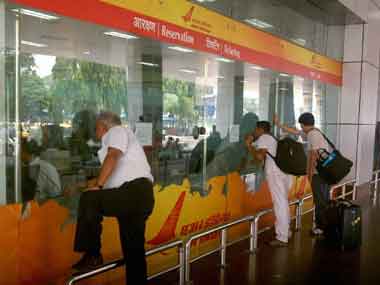 New Delhi, Sep 3: Get set for skyhigh air fares from next month when the peak travel period kicks off with the festive season. Oil companies have hiked aviation turbine fuel (ATF) prices by 7%, taking the prices of jet fuel — which is the single largest component of an airline's operating cost — to an all-time high. Now ATF per kilo-litre costs Rs 75,031 in Delhi; Rs 77,632.4 in Mumbai and is the steepest in Kolkata at Rs 85,645.1.
New Delhi, Sep 3: Get set for skyhigh air fares from next month when the peak travel period kicks off with the festive season. Oil companies have hiked aviation turbine fuel (ATF) prices by 7%, taking the prices of jet fuel — which is the single largest component of an airline's operating cost — to an all-time high. Now ATF per kilo-litre costs Rs 75,031 in Delhi; Rs 77,632.4 in Mumbai and is the steepest in Kolkata at Rs 85,645.1.
"The July-September period is the leanest travel season of the year and at the moment, airlines are selling tickets at low fares to fill up planes. So hiking fares now may not be possible. Spot fares in the October-mid January season will be high. Expect a 25%-50% hike in spot fares in that period," said an airline official.
The only way to escape high fares in that period will be to book as early as possible. "Advance domestic fares are very reasonable as airlines want to fill planes and also generate some much-needed cash. People should book now," said Anil Kalsi, a leading Delhi-based travel agent.
ATF, whose price is high due to mix of high base price by oil companies and exorbitant sales tax rates by states, accounts for over half of an airline's operating cost. Oil PSUs revise jet fuel prices in the beginning of every month, depending on price of international crude and rupee's exchange rate with the dollar. The latest hike has now brought ATF at record high, surpassing the previous high set last September. A year back, ATF cost was Rs 73,710.0 in Delhi — which was the highest ever then and in exactly a year a new record level has been reached. The aviation ministry has called a meeting of state aviation ministers next week and the issue of reducing sales tax will be discussed there, with more focus on Delhi and Mumbai to lower their taxes on ATF.
Airline sources point out that ATF prices have risen 22% from July to September. The overall cost of operations has gone up by 20% due to jet fuel prices and rupee devaluation. "While costs are up 20%, fares are lower by 30%. In early July, spot fares of Delhi-Mumbai and Delhi-Bangalore were about Rs 9,000 and Rs 9,800 respectively. The current spot fares for these two routes are Rs 6,000 and Rs 6,500. This is recipe for disaster," said an airline official.
Domestic airlines have long complained of facing an extremely cost-hostile environment in India. The Centre for Asia Pacific Aviation (CAPA) estimates that airlines here have collectively lost Rs 53,650 crore from 2007 to 2013 and their debt on March 31, 2013, was close to Rs 1 lakh crore. "(While costs are significantly up), yields or fares are down by 30%. The industry has completely lost pricing focus....
Industry risk is at peak and I don't rule out any industry rationalization (hinting at another airline's closure) out of this crisis," CAPA India chief Kapil Kaul said.





Comments
Add new comment